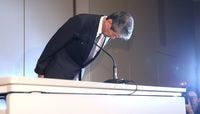By Linda Sieg and Teppei Kasai
TOKYO (Reuters) - Wearing shorts and a baggy T-shirt and clutching a microphone, Aki Okuda stands before a crowd, the pyramid-shaped roof of Japan's parliament lit up against the night sky behind him.
"No War", "Protect the Constitution", "Abe - Quit!", he chants in a hip-hop rhythm, echoed by the crowd.
Okuda, 23, is a founding member of a group of students that has become a fresh face of protest against Prime Minister Shinzo Abe's push to enact a more robust defence policy - steps critics say violate the pacifist constitution and could ensnare Japan in U.S.-led wars.
Students Emergency Action for Liberal Democracy (SEALDs) is also denting the image of Japanese students as either apolitical introverts, who left protests to their elders, or rightwing geeks.
Japan has not seen significant student protests since the 1960s, and civic demonstrations since then have been peopled primarily with greying left-wing activists.
That changed when SEALDs sprang to public notice by sponsoring weekly rallies near parliament against unpopular defence bills that Abe's ruling bloc pushed through the lower house last month.
The bills, based on a cabinet resolution reinterpreting Japan's pacifist constitution, could let troops fight abroad for the first time since World War Two.
"If one government can change things just with their interpretation, then the constitution itself is altered and the government can do whatever it wants," Okuda, wearing a T-shirt with the motto "Destroy Fascism", told Reuters.
Unlike the Marxist students who took to Japan's streets in the 1960s, SEALDs members shun violence. Their manifesto urges respect for the constitution, a robust social safety net and peaceful security policies - concepts that opinion polls suggest resonate with many 70 years after Japan's defeat in World War Two.
Public angst over the defence bills has eroded support for Abe, with polls showing those who oppose him outnumbering his supporters. But SEALDs is getting under the skin of right-wing nationalists, with blogs hinting that the group may harbour Chinese spies - an accusation for which there is no serious evidence.
Advocates of the security bills argue the changes are needed to help cope with the threat of an increasingly assertive China.
"GALVANIZING OTHER AGE GROUPS"
Formed in December 2013 by students shocked by passage of a controversial state secrets act, SEALDs now has nearly 400 members.
"A TV announcer said 'Today, democracy has ended'," Okada said, recalling the day the secrets act passed parliament. "But we thought, if there is an end, there is also a beginning."
The students were also motivated by the inability of huge protests after Japan's March 2011 Fukushima nuclear disaster to derail government plans to restart off-line reactors.
SEALDs is cooperating with about a dozen civic activist groups in organising a protest rally on Sunday that sponsors hope will attract 100,000 people.
In a show of youthful exuberance, SEALDs is dreaming of an even bigger turnout - a 300,000-strong crowd equal to that which in 1960 forced Abe's grandfather, then-premier Nobusuke Kishi, to quit over a U.S.-Japan security treaty.
"They are galvanizing other age groups," said Koichi Nakano, a professor at Sophia University in Tokyo. "SEALDs projects the image that you can be normal and fashionable and political at the same time."
Kazuto Nakayama, 68, who took part in a protest last week, said it was time for "older folks" to pass the baton.
"I think we cannot change Japan without the power of youth," he said.
Okuda admits that blocking the security bills will be tough since opposition parties are split and outnumbered.
Analysts say toppling Abe is also a long-shot, but the public backlash against the security bills could well make his ruling Liberal Democratic Party wary of pushing even bolder changes, such as formally revising the constitution.
The students are already eyeing a July 2016 upper house election, when the voting age will be lowered to 18 from 20, as a chance to weaken the LDP's grip on power.
"This is not a top-down movement, mobilised by the leaders of certain groups," Okuda said. "No one can stop people who have begun to think and take action as individuals."
(Additional reporting by Kiyoshi Takenaka and Yuki Shibata; Editing by Nick Macfie)



